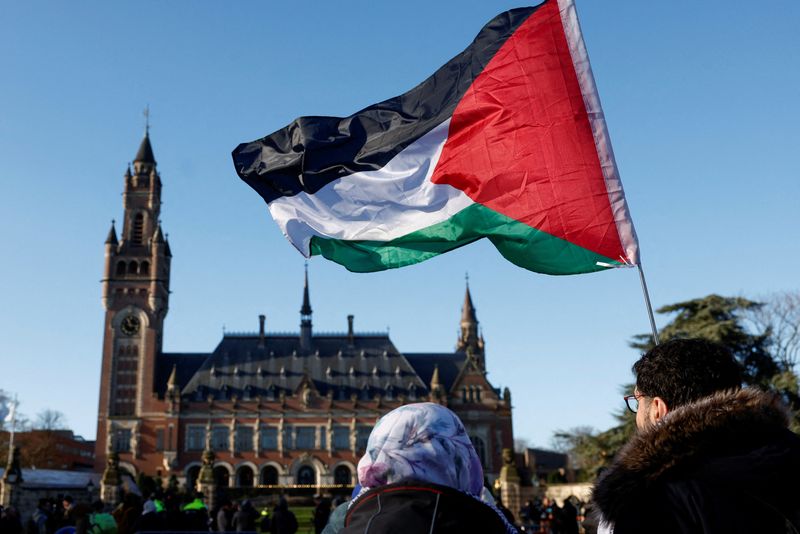
©Reuters. FILE PHOTO: Protesters hold a Palestinian flag as they gather outside the International Court of Justice (ICJ) as judges rule on emergency measures against Israel following South Africa’s accusations that Israel’s military operation in Gaza is a state
By Anthony Deutsch and Stephanie van den Berg
THE HAGUE (Reuters) – Palestinian representatives asked judges of the United Nations’ highest court on Monday to declare Israel’s occupation of their territory illegal, saying their advisory opinion could contribute to a two-state solution and lasting peace .
The requests came at the start of a week of hearings at the International Court of Justice (ICJ) in The Hague. The UN General Assembly has called for an advisory, or non-binding, opinion on the occupation in 2022. More than 50 states will present their arguments until February 26.
“We ask you to confirm that Israel’s presence in the occupied Palestinian territories is illegal,” Riad Mansour, the Palestinian representative to the United Nations, said in a speech in which his voice broke and he cried.
“A decision by this distinguished court…would help bring an immediate end to (the occupation), paving the way for a just and lasting peace,” he said. “A future where no Palestinian and no Israeli will be killed. A future where two states will live side by side in peace and security.”
The latest wave of violence in Gaza, spurred by the October 7 attacks in Israel by Hamas, has complicated already deeply rooted grievances in the Middle East and damaged efforts to find a path to peace.
The ICJ’s 15-judge panel was asked to review Israel’s “occupation, settlement and annexation” … including measures aimed at altering the demographic composition, character and status of the Holy City of Jerusalem, and its adoption of related discriminatory laws and measures.”
Israel will not participate in the hearings but sent a 5-page written statement published by the court on Monday in which it said an advisory opinion would be “harmful” to attempts to resolve the conflict because questions posed by the UN General Assembly would be prejudicial.
The judges are expected to take around six months to issue an opinion on the request, which also asks them to consider the legal status of the occupation and its consequences.
Israel captured the West Bank, Gaza and East Jerusalem – areas of historic Palestine that the Palestinians want to establish as a state – in the 1967 war and has built settlements in the West Bank and steadily expanded them ever since.
Israeli leaders have long disputed the territories’ formal occupation on the grounds that they were captured from Jordan and Egypt during a war rather than sovereign Palestine.
Since 1967, the United Nations has defined territories occupied by Israel and called for the withdrawal of Israeli forces, saying it is the only way to ensure peace. Its 1967 resolution, however, did not specifically label the occupation as illegal.
Although Israel has ignored legal opinions in the past, it could increase political pressure on its war in Gaza, which has killed around 29,000 Palestinians, according to Gaza health officials, since Hamas attacked Israel on October 7.
It withdrew from Gaza in 2005 but, together with neighboring Egypt, still controls its borders. He also annexed East Jerusalem in a move not recognized by most countries.
‘MORAL, POLITICAL AND LEGAL IMPERATIVE’
The hearing is part of Palestinian efforts to convince international legal institutions to examine Israel’s conduct. These intensified after Israel’s war on Gaza in response to Hamas attacks, which killed 1,200 people, according to Israeli counts.
Israel said it faced an existential threat from Hamas militants and other groups and was acting in self-defense.
Concerns are growing over an Israeli ground offensive against the Gaza city of Rafah, the last refuge for more than a million Palestinians who have fled to the south of the enclave to avoid Israeli attacks.
It is the second time that the United Nations General Assembly has asked the International Court of Justice, also known as the World Court, for an advisory opinion relating to the occupied Palestinian territories.
In July 2004, the court ruled that the Israeli separation wall in the West Bank violated international law and must be dismantled, although it still stands to this day.
(This story was reposted to “occupation,” not “resolution,” in paragraph 11)